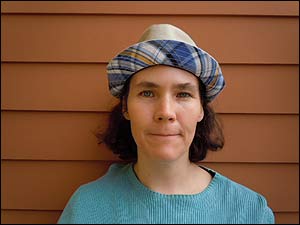
An Unfair Stigma
Few with mental illness are violent
By Elizabeth Gerrity
Dont feel badly about yourself if you dont know better than to think that homeless people are lazy, stupid and/or violent people. Confusion is so easy. After all, understanding people is difficult when a limitless number of possible factors contribute to the mannerisms, behaviors and characteristics of people.
 |
The error of widespread stigmas doesnt help understanding. For example, one stigma associated mental illness with violence. However, its statistically proven that 90 percent of violent crimes are committed by persons without a mental illness. Also, the percentage of mentally ill persons who do commit violent crimes is truly very small, considering the large number of persons who really have a mental illness.
I think that “coming out” as persons with mental illness will help to clarify misunderstanding. Coming out isnt simple, though. This might not be easy to understand if a person hasnt experienced the social banishment that many persons with mental illness arent free from.
Persons with mental illnesses are usually very peaceful people who often dont know how to protect themselves from abuse. According to Wikipedia, mentally ill persons are much more likely to be abused because of their own vulnerability than they are to abuse other people. Its sad that many people dont know this.
On a similar note, it might not be easy to understand that persons who dont express compassion for vulnerable people are usually peaceful. People who appear to be insensitive are often overly sensitive and have difficulty resolving personal issues like insecurity and a fear of powerlessness.These people need help.
Homeless people might not understand insensitive people easily after surviving social neglect/abuse even though they experienced the sufferings of an often cold and always hard resting place, exposed to elements and the violence of perpetrators, 24 hours a day, seven days a week. These people need help.
When people who have homes and stability understand the tragedy of this, they often take action to help. People like this helped me. Although social opposition is in many places, Eugene shelters helped me regardless of my dissociative disorder which is a mental illness, my traumatic brain injury that created difficulties that sometimes resembled a mental illness, and long-term experiences of being abused that confused me. My relentless determination to be safe made welfare services available to me.
Many homeless people avoid the few existing shelters because of various factors, including prejudicial treatment. Better shelters can be made.
Surviving trauma affords many people insight that can benefit society when allowed. Together, we can overcome social obstacles to benefit everyone. May we all receive the care we need.
Please help in any way you can to support a new, secular shelter to benefit all the homeless, including the 33 percent with mental illnesses, the 33 percent who dont make enough money to rent or purchase a residence, the 33 percent who choose to be homeless, and the persons with substance abuse issues. We will all benefit from this.
Thanks for your assistance.
Elizabeth Kathleen Gerrityof Eugene was educated at three different colleges in Arizona, Hawaii, and Oregon, studyingtwo-dimensional art, culinary arts and graphic design,while she experienced multiple disabilities. Find information on her Anutuks Homeless Shelter project a http://bit.ly/gzPNbP